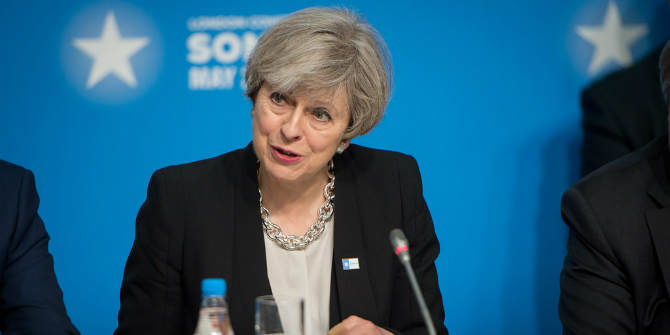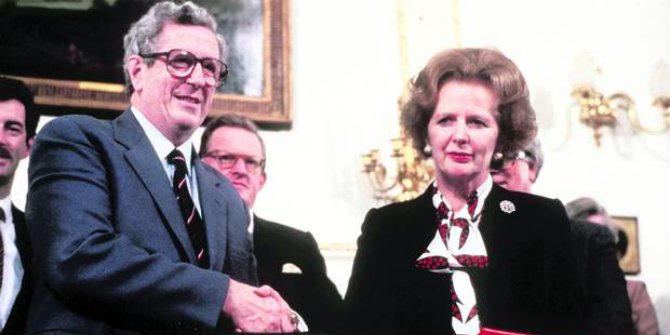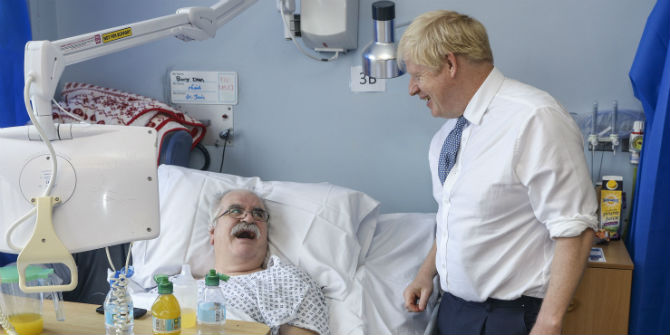The terms of the political debate about Brexit in the aftermath of the General Election are gradually becoming clearer. Since the Brexit project is an essentially irrational one, its discussion will always tend towards paradox and conundrum. Nevertheless, the weeks since the General Election have clarified the choices with which the British government and other political actors are likely to find themselves confronted over the coming months. How they will react to these choices remains as much a matter of speculation as ever. A chaotic Brexit remains a distinct possibility, writes Brendan Donnelly.
The major theme of Theresa May’s European rhetoric during the election campaign was that of resolute determination to extract the maximum number of concessions from her European partners in the forthcoming Brexit negotiations. A reinforced Parliamentary majority would supposedly help her in this endeavour. An important and contradictory minor theme of her election campaign was, however, that of her need to enjoy a strong majority in the new Parliament in order to lessen her dependence on the most radical Eurosceptic elements of the Conservative Parliamentary Party. This mixture of messages was opportunistic in its attempt to appeal to a variety of potential Conservative voters. It also prefigured one possible outcome of the Brexit negotiations, whereby the Conservative Prime Minister of the day will be driven by economic and political reality to uncongenial compromises, but will need to conceal these concessions by a show of belligerent self-congratulation. Unfortunately for May, the disastrous outcome of the election she provoked has strengthened her negotiating hand neither with the rest of the European Union, nor with potentially recalcitrant elements of the Conservative Party.
Ironically, this recalcitrance within May’s party has come since the General Election most notably from an unexpected source, namely that minority of Conservative MPs who remain doubtful about the whole concept of Brexit and who fear the economic dangers implicit in a chaotic British withdrawal from the Union. There seems little doubt that their most prominent representative, the Chancellor of the Exchequer Philip Hammond, would have been dismissed from office had May won a resounding victory on 8 June. Her weakness after the results of the General Election became known prevented her from carrying out this dismissal. Hammond has used this reprieve to stake out an approach to Brexit very different in tone and potentially even in substance from that of May before the election. Unlike the Prime Minister, Hammond has never affected to believe that British withdrawal from the European Union is an opportunity containing promises of a better tomorrow. He sees it rather as a problem to be managed in a way doing the least possible economic damage to the United Kingdom. The slowing down of the British economy in the first half of this year has served to reinforce and make more credible his reservations.

In essence, the indecisive result of the General Election has made it possible for Philip Hammond and those who support him to provide some check at least to what had seemed an irresistible momentum within the Conservative government towards a non-negotiated British withdrawal from the European Union. While publicly endorsing May’s desire eventually to leave both the European single market and the Customs Union, Hammond has put back into the mainstream of Conservative thinking the concept of a substantial transitional arrangement before these desired goals are achieved. He does not appear to share the Prime Minister’s view that “no deal is better than a bad deal.” His preferred formula is that “no deal is better than a deal that punishes the UK.” Hammond is unlikely to believe that the UK’s European partners genuinely want to punish the United Kingdom. Like Donald Tusk, he knows that the British government is doing a good job of punishing the UK already by pursuing the nonsensicality of Brexit.
It would, however, be wrong to forget that Hammond and his supporters only constitute one wing of today’s Conservative Party. May’s new ministerial team has had to find room for such prominent Eurosceptics as Michael Gove and Steve Baker. For a number of reasons, the most radical Eurosceptics within the Conservative Party have decided in the short term to acquiesce in May’s continuing leadership of the Conservative Party; they have tolerated the major concession made by the British side on 19 June, that of accepting the EU’s preferred timetable for the Brexit negotiations; their major representatives such as Dr. Fox no longer regard as taboo the possibility of a limited “transition period” after March, 2019; and May’s government has been allowed to make an initial offer to its European partners on the subject of reciprocal rights for British and EU citizens after Brexit. But it would be optimistic in the extreme to imagine that the power of radical Euroscepticism or the determination of its many representatives within the Conservative Party have been broken by the results of the General Election.
Ironically, the agreement to discuss in the first stage of the Brexit negotiations only the issues strictly relating to the UK’s leaving the European Union may give the radical wing of the Conservative Party its best chance to seize once more the political advantage. May’s initial proposals concerning the reciprocal rights of EU and British citizens after Brexit have met with a distinctly cool response from her European partners. The proposals had by contrast been seen from the British side as a “generous offer,” an obviously self-serving description that did not long survive contact with negotiating reality. This underlying difference of perception does not bode well for the further course of negotiations. When these negotiations turn to the so-called “divorce bill,” the domestic difficulties faced by the Conservative government in coming to any agreement with its European partners will be extreme. It would be amazing if those favouring a non-consensual Brexit in the Conservative Party did not use this element of the Brexit negotiations as a substantial stick with which to beat both the European Union negotiators and any British ministers set upon compromise in this thorny issue.
Any compromise on the financial settlement will be ripe for exaggeration and misrepresentation in the Eurosceptic press
Although in terms of overall government expenditure the sums involved in the European budget are small, they have always produced disproportionately fierce political controversy, especially in the United Kingdom. The Leave campaign during last year’s referendum effectively exploited the resentment of wide swathes of British public opinion that the UK has always been a net contributor to the EU budget. Any conceivable compromise on the financial settlement for Brexit will be ripe for damaging exaggeration and misrepresentation in the Eurosceptic press. It is almost inconceivable that a weakened May, or indeed any other Conservative leader, would be able to persuade the Conservative Party to accept a financial settlement involving at the least many tens of billions of euros.
If the field of the financial settlement is one on which it is advantageous for them to fight, the more far-sighted radical Eurosceptics in the Conservative Party may also realise that all later alternative fields will be increasingly problematic for them. Once the European Council concludes that “sufficient progress” has been made on the initial issues of Brexit, including the financial settlement, negotiations will begin on the future trading relationship between the United Kingdom and the European Union. The remorseless progress of these detailed negotiations, carried out in the fullest glare of publicity ensured by the EU’s negotiators, is likely over time to reveal in the starkest terms the true absurdity of the Brexit proposition. During the negotiations with Michel Barnier and his team, it will become clear to the British public that in these negotiations the British government is confronted with a limited and unpalatable range of options. It can choose a merely damaging Brexit, changing as little as possible, as slowly as possible of the present economic and trading relations between the United Kingdom and the European Union; or it can choose a disastrous Brexit, sweeping away to the greatest extent possible the basis on which commerce has been conducted between the UK and the EU over the past forty years and creating an unpredictable economic environment in which the only certainty is that the immediate future will be worse than the recent past. If the second phase of the Brexit negotiations ever comes into being, they are likely to provide a daily demonstration of the implausibility of the goal of “making a success of Brexit.”
the second phase of negotiations are likely to provide a demonstration of the implausibility of “making a success of Brexit”
There is an added attraction for the most uncompromising advocates of an unnegotiated Brexit if they can prevent the British government from ever proceeding to the second phase of the Brexit negotiations. It is that such a course of action will facilitate the marginalisation of the House of Commons in the Brexit process. An impasse in the negotiations, if continued until 29 March 2019, will ensure that the United Kingdom leaves the European Union on that date, without need for any Parliamentary involvement beyond occasional crocodile tears in the Commons from British ministers lamenting the intransigence of their European negotiating partners. If this intransigence could be presented as manifesting itself particularly in the financial settlement for Brexit, the government would feel itself on strong domestic political ground to exercise intransigence of its own.
Over the past year, an interesting development in the use of the term “hard Brexit” has occurred. Originally, the term referred simply to leaving the internal market and/or leaving the Customs Union when the UK left the European Union. Many representatives of the “Leave” camp during the referendum specifically disavowed any such intention. Under predictable pressure from her backbenchers, May then made clear at the beginning of this year that she favoured leaving both the internal market and the Customs Union. The term “hard Brexit” then metamorphosed into one still signifying leaving the internal market and Customs Union but doing so without any agreement between the UK and the EU to replace these long-standing pillars of their economic relationship. There will undoubtedly be within May’s Conservative Party many and highly-paced advocates of precisely such a course. Continuing stalemate in the first phase of the Brexit negotiations might well be their preferred option for bringing that about.
the General Election has not banished entirely the possibility of a “hard Brexit”
It is clear therefore that the General Election has not banished entirely the possibility of a “hard Brexit” as recently redefined. If the first phase of the Brexit negotiations does seem to have arrived at a definitive stalemate, possibly towards the end of the year, the Conservative Prime Minister of the day will be faced with challenging Parliamentary arithmetic. The DUP has undertaken to support Conservative policy on Brexit, but might well baulk at supporting the reintroduction of customs and other barriers at the Irish border, a direct consequence of a “hard Brexit.” The SNP as a whole and the great majority of Labour MPs could be expected to oppose the emerging Conservative failure to move to the second phase of the Brexit negotiations. The Conservative leader will need the Conservative Parliamentary Party substantially united at his or her back. As ever, much will turn on the decisions of the now small minority of pro-European Conservative MPs. It has been estimated that there are some thirty Conservative MPs unwilling in any circumstances to tolerate a “hard Brexit”. If that is so, they may find themselves challenged to show their true colours rather sooner than they would have hoped, at the beginning rather than at the end of the Brexit negotiations. This will be an unwelcome and unexpected development for some of them. It is not however always possible to put an end to a long period of procrastination at a time of the procrastinator’s choosing.
An earlier version of this post appeared on The Federal Trust and it represents the views of the author and not those of the Brexit blog, nor the LSE.
Brendan Donnelly has been Director of the Federal Trust since January 2003 and is a Senior Research Fellow at the Global Policy Institute. He is a former Member of the European Parliament (1994 to 1999).








The DUP might not baulk if they can gain even more funding from HMG. Remember their overriding interest is the Union of the United Kingdom.of Great Britain and Northern Ireland.